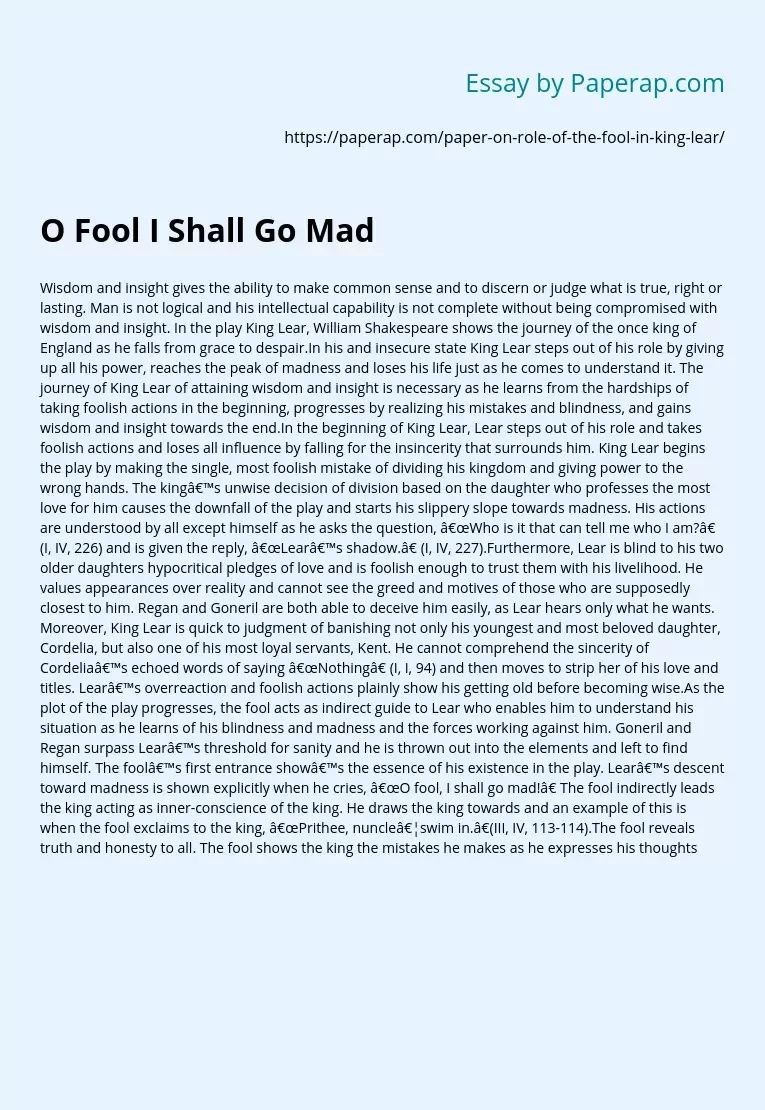Wisdom and insight gives the ability to make common sense and to discern or judge what is true, right or lasting. Man is not logical and his intellectual capability is not complete without being compromised with wisdom and insight. In the play King Lear, William Shakespeare shows the journey of the once king of England as he falls from grace to despair.In his and insecure state King Lear steps out of his role by giving up all his power, reaches the peak of madness and loses his life just as he comes to understand it.
The journey of King Lear of attaining wisdom and insight is necessary as he learns from the hardships of taking foolish actions in the beginning, progresses by realizing his mistakes and blindness, and gains wisdom and insight towards the end.In the beginning of King Lear, Lear steps out of his role and takes foolish actions and loses all influence by falling for the insincerity that surrounds him.
King Lear begins the play by making the single, most foolish mistake of dividing his kingdom and giving power to the wrong hands.
The king’s unwise decision of division based on the daughter who professes the most love for him causes the downfall of the play and starts his slippery slope towards madness. His actions are understood by all except himself as he asks the question, “Who is it that can tell me who I am?” (I, IV, 226) and is given the reply, “Lear’s shadow.
” (I, IV, 227).
Furthermore, Lear is blind to his two older daughters hypocritical pledges of love and is foolish enough to trust them with his livelihood. He values appearances over reality and cannot see the greed and motives of those who are supposedly closest to him. Regan and Goneril are both able to deceive him easily, as Lear hears only what he wants.
Moreover, King Lear is quick to judgment of banishing not only his youngest and most beloved daughter, Cordelia, but also one of his most loyal servants, Kent. He cannot comprehend the sincerity of Cordelia’s echoed words of saying “Nothing” (I, I, 94) and then moves to strip her of his love and titles. Lear’s overreaction and foolish actions plainly show his getting old before becoming wise.
As the plot of the play progresses, the fool acts as indirect guide to Lear who enables him to understand his situation as he learns of his blindness and madness and the forces working against him. Goneril and Regan surpass Lear’s threshold for sanity and he is thrown out into the elements and left to find himself. The fool’s first entrance show’s the essence of his existence in the play.
Lear’s descent toward madness is shown explicitly when he cries, “O fool, I shall go mad!” The fool indirectly leads the king acting as inner-conscience of the king. He draws the king towards and an example of this is when the fool exclaims to the king, “Prithee, nuncle…swim in.”(III, IV, 113-114).The fool reveals truth and honesty to all.
The fool shows the king the mistakes he makes as he expresses his thoughts about the decision the king made in the beginning, “I have …own breeches.” (I, IV, 169-171). The king is blind to all this until the fool reveals it to him. The fool tells the king that he would be a good fool but if he was his fool he would have “thee beaten for being old before they time.” (I, V, 41). Through the guide of the fool acting as his inner conscience and revealing truth the king understand and realizes his own blindness.After being inspired by the fool, Lear realizes his new found insight, his ability to see beyond appearances, and understand his mistakes. In the end, Lear is finally able to notice how others have treated him.
Through the mock trial he sorts out all the evil and comprehends all that happened during the play. It is after the trial that the fool leaves the play as his job is over and the king can see clearly for himself. Lear expresses his understanding when he says, “they flattered me like a dog…”(III, VI, 112-116). He realizes his mistakes and regrets them.When Cordelia shows up he say, “I pray weep not…they have not.”(IV, VII, 81-85). In addition, he begins to see clearly of his surroundings. His ability to see is also evident towards the end when he finally recognizes Kent. In the end Lear gains wisdom and insight, however, dies out of a broken heart.
King Lear’s journey can be traced through his absence of wisdom and insight which is replaced with the vital role of the fool who allows the king to come back to sanity with a clear insight of his surroundings. Through the play, King Lear, Shakespeare shows the necessity of the journey for gaining insight and wisdom. He portrays this in the role he gives to the fool of representing these two important qualities.Human beings tend to be misguided by their misinterpretations and lack of knowledge of their surroundings.
It is not until they gain wisdom and insight that they begin to see through a broad and clear window. As is often done in reality, the life of King Lear is shaped by his own hands and his inability to make the wise decision at the beginning of it.
O Fool I Shall Go Mad. (2019, Dec 05). Retrieved from https://paperap.com/paper-on-role-of-the-fool-in-king-lear/

